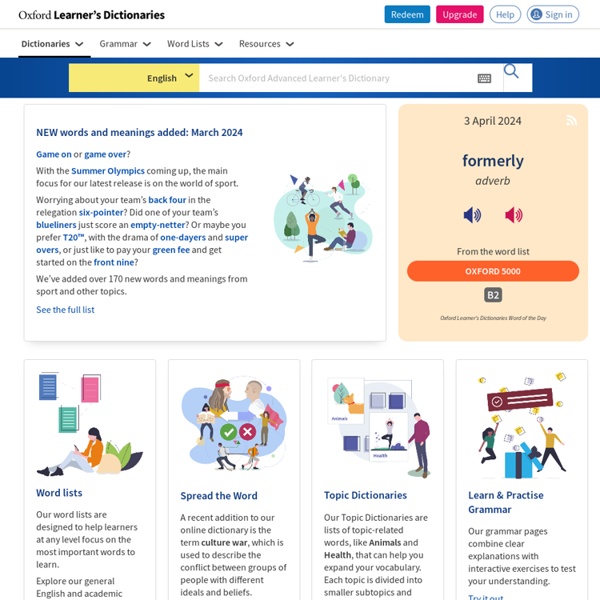



http://www.oxfordlearnersdictionaries.com/us/
Related: VocabESL Worksheets, English Word Formation, Prefixes, Suffixes Teach Kids to Read with Phonics - Games, Videos, Worksheeets Word Formation Worksheets Prefixes and Suffixes- Affixes & Root Words to Guess Meaning A prefix is a letter or group of letters added to the beginning of a word to make a new word: In the word '”UNHAPPY”, 'UN-' is a prefix added to HAPPY. UN- is a Latin word for NOT. A suffix on the other hand is a letter or group of letters added to the end of a word to make another word. Home page for British English Dictionary and Thesaurus With clear definitions and useful study extras, this monolingual dictionary can help you on your way to becoming a confident, natural-sounding English speaker. Cambridge Advanced Learner's Dictionary is the best dictionary for general British English on Cambridge Dictionaries Online. Select "British English" from the list of dictionaries at the top of any page on Cambridge Dictionaries Online to search this dictionary. Favourite Entries
UK slang for international students By Sophie Cannon at Education UK, 27 January 2014 'Hiya mate, fancy a cuppa and a chin-wag?' 'I can't sorry pal, I'm skint. grahamworkmansecondary - Useful websites Skip to main content Create interactive lessons using any digital content including wikis with our free sister product TES Teach. Get it on the web or iPad! guest 20 Misused Words That Make Smart People Look Dumb We're all tempted to use words that we're not too familiar with. If this were the only problem, I wouldn't have much to write about. That's because we're cautious with words we're unsure of and, thus, they don't create much of an issue for us. It's the words that we think we're using correctly that wreak the most havoc. We throw them around in meetings, e-mails and important documents (such as resumes and client reports), and they land, like fingernails across a chalkboard, on everyone who has to hear or read them.
English Skills: 7 ways of saying “I don’t know” In this second post dedicated to life skills in English, I’d like to focus on the different ways you can say “I don’t know” in English. As my clients will tell you, saying “I don’t know” to me is not an option in our lessons! I will not allow my clients to rely on me to give them the answers before they have tried themselves to seek the answers. However, in life we are at some stage going to have to use this expression, so as variety is the spice of life, using different ways to say “I don’t know” would make your conversation far more interesting and natural. As in the first post of the series, my inspiration comes from Macmillan Dictionary blog‘s own series.
50 Popular English Idioms to Sound Like a Native Speaker To understand English as it is spoken in real life, you have to be familiar with idioms. They are used so much in everyday English that it is important to be aware of them. You need to learn what they mean, and how to use them to become an ‘insider’. This blog post will show you some of the most popular English idioms currently in use. Remember, knowledge is power. Tim's Free English Lesson Plans Image credit: teaching.berkeley.edu Follow me on twitter @RobbioDobbio I’m running the Barcelona Half-Marathon dressed as David Bowie to raise money for Cancer Research, sponsor me here: Koprowski - Ten Good Games for Recycling Vocabulary The Internet TESL Journal Mark Koprowskimarkkoprowski [at] yahoo.com Introduction Learning is remembering. If we respect this axiom, the review and recycling of new language items will be critical if they stand a chance of becoming readily accessible in long-term memory.
Seven steps to vocabulary learning You might expect that, after having been exposed to a word in ten, twenty, or maybe at the very most thirty, contexts, a learner will gradually piece together the word's meaning and start to use it correctly, appropriately and fluently. Classroom context Seven steps to vocabulary learning Conclusion Classroom context Of course we cannot expect a learner to acquire difficult words in the same way as a young child acquires their first language, but, perhaps as teacher we can somehow help learners to arouse their 'learning monitor' by, for example, providing rich contexts containing the target language and by giving our learners time to reflect on what the language item means.
Nine ways to revise English vocabulary using slips of paper What can teachers do when classroom technology stops working? Cristina Cabal, latest winner of the British Council's TeachingEnglish blog award for her post on pronunciation, suggests nine activities for revising English vocabulary using simple slips of paper. Nowadays, it seems very simple to plan a lesson that makes use of the many tools available online, especially as more and more of us have access to the Internet in our classrooms. But while technology is increasingly part of our teaching, there are times when it can cause problems and frustrations for teachers, such as when the Wi-Fi stops working or the computer shuts down, leaving you with a one-hour lesson to teach and no plan B up your sleeve. One of the best ways to deal with this situation is to use slips of paper – a resource available to every teacher in any given situation. The following activities have never let me down.
Grab Onto Phrasal Verbs Welcome back to Everyday Grammar from VOA Learning English. Today we look at a very common verb form in English – phrasal verbs. There are over 5,000 verbs that fall in this category. Do you know how to use them? In this episode, we will introduce this type of verb and help you understand how and why English speakers use them. In future episodes, we will give more information about the different kinds of phrasal verbs.
Une des références en matière de langue anglaise by jmaia Aug 7